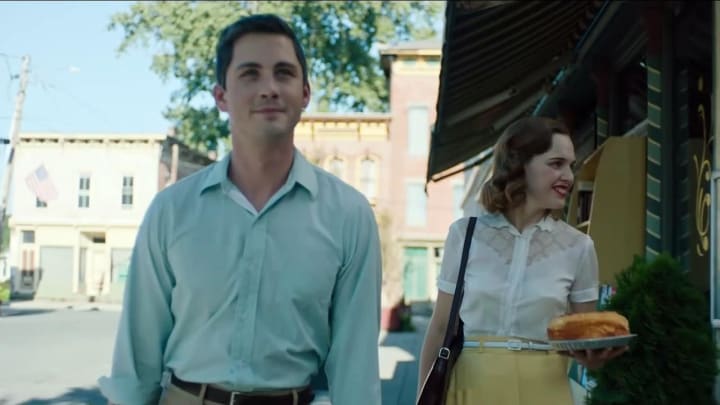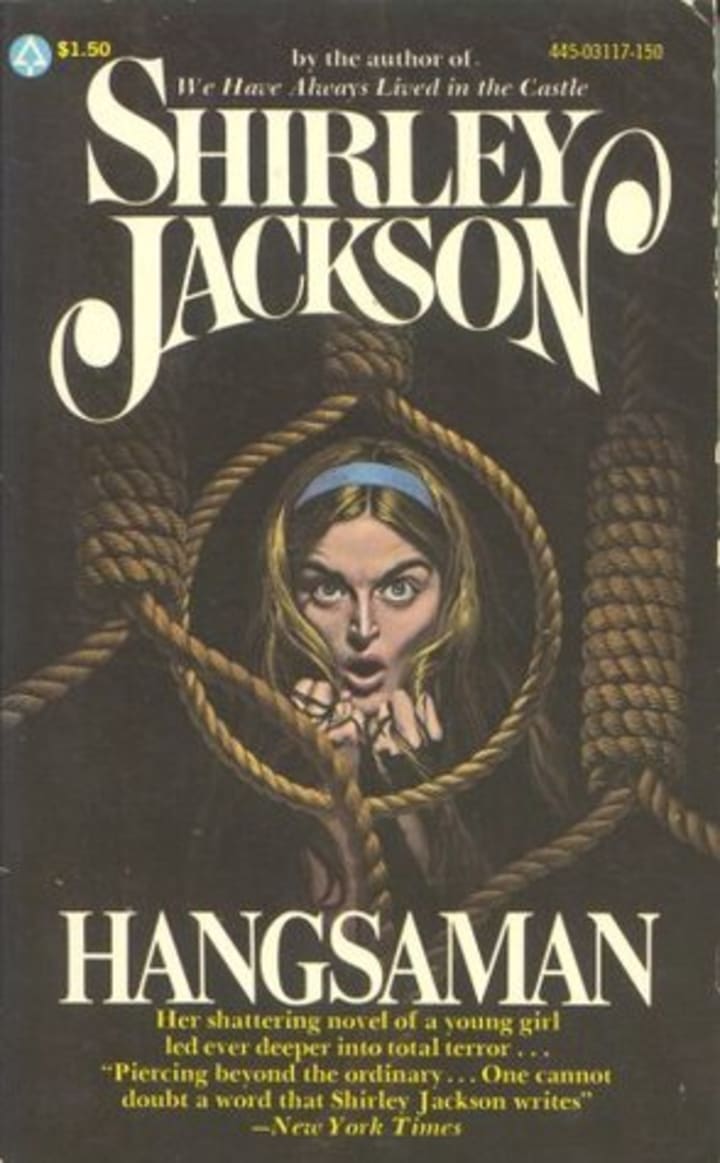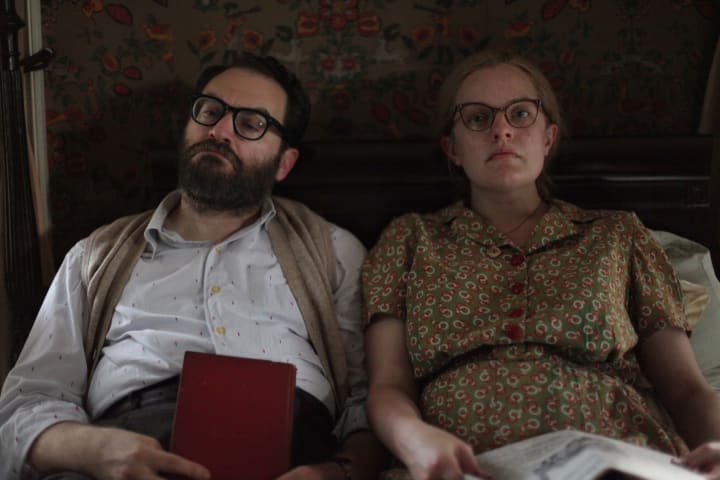Movie Review: Four Women Shine in 'Shirley'
Female stars, Director and Writer all shine in haunting, riveting, and rollicking pseudo-bio 'Shirley'.

Have you ever met someone whose mood is capable of controlling the temperature in the room they are in? The Shirley Jackson portrayed by Elisabeth Moss in the new movie, Shirley, is one of those people. Whatever room Shirley is in appears colder when she’s there. Her very being bespeaks a menacing intelligence so present it could bite. Shirley is portrayed here as being so quick witted that she could kill with words.
Shirley re-frames the story of legendary novelist Shirley Jackson in a new take on Who’s Afraid of Virginia Woolf crossed with the work of Ari Aster. It’s a remarkable reframing and Shirley carries the power of this combination throughout its story. The setting is the early 1950’s on the campus of Bennington College where Shirley Jackson is holed up, sheltered by her husband, Stanley (Michael Stuhlbarg), who wears their marriage as a cloak of celebrity.

Shirley’s fame as a writer appears to make their life as the center of the campus social scene possible and Stanley is living it up to the fullest. As we join the story, their home is abuzz with a party, except for one room. That’s the room where Shirley is seated smoking a cigarette and warding off revelers with the power of her glare. It’s at this point that the other duo in this Virginia Woolf homage arrives.
Odessa Young and Logan Lerman play Rose and Fred Nemser. Fred has moved the newly married couple to Bennington College where he is set to work as an associate professor under Stanley. For the first few weeks on campus, Stanley has agreed to host them until they find a place of their own. Stanley has done this without speaking with Shirley first and she sets about demonstrating her displeasure by verbally assaulting Rose during a tense first breakfast.

Stanley has made the relationship all the more complicated by enlisting Rose to be a temporary housekeeper and caretaker to Rose. Though Rose had academic aspirations of her own for her time at Bennington, she’s also with child, something that Shirley is almost preternaturally aware of, as if she had the terrifying ability to smell a pregnancy. Rose is uncomfortably subjugating herself to support her husband’s job at the moment and this is another sore spot that Shirley doesn’t mind pressing upon.
Shirley isn’t all withering stares and verbal daggers thankfully. Most of the time she’s unwilling to get out of bed, leave the house or do much of anything. Shirley has been suffering writer's block and depression but as she begins to accept young Rose as a fixture in her home, she also begins down the road toward writing another bestselling book. The story of a young woman on the Bennington campus who has gone missing without a trace has intrigued Shirley enough to return to her typewriter.
Frightening visions appear to drive Shirley’s new effort titled Hangsaman; the real life title of a book Shirley wrote much before the setting of the movie, in 1951. In her mind’s eye, Shirley begins to envision Rose as the missing girl and she’s driven to pursue Rose as if she were pursuing the missing girl. For her part, the part of Rose that she’s sacrificed to support Fred, feels like it has gone missing and Shirley’s pursuit of that part of her is appealing.

Yes, there is an undertone of same sex tension in Shirley and Rose’s relationship but it’s only one aspect of a stew of simmering emotions. Both women are in a deep emotional turmoil and that is as much a part of their bond as anything else. The complexity of Shirley and Rose’s relationship is the driving force of the plot of Shirley, as both women deal with the real and perceived infidelities of their husbands and their shared curiosity about the missing girl whose disappearance fascinates for specific reasons.
I am being intentionally vague as I don’t want to spoil anything of Shirley. This is not a story that can truly be spoiled, in the sense of plot twists or conventional plot elements, but, there are developments in the story that are better experienced without too much foreknowledge. The other plot driver is Shirley’s relationship with Stanley, another simmering pot of conflict with Stanley’s ego and insecurity, the perfect vehicle for Michael Stuhlbarg’s talent for playing men whose veneer is cracking ever so slowly.
The role of Stanley is much smaller than that of Shirley, of course, and Rose and yet there is an entire movie worth of personality in Stuhlbarg’s Stanley. Stanley has the unearned confidence of a man who has collected notes on many powerful people and feels untouchable by extension. Yet, he also carries the insecurity of a man who knows that many of those notes are actually held his wife and it is her power and celebrity that makes his life possible.

He leans on Shirley to write not because he is a loving patron of her work and a supportive partner but because their fortune is wavering and he needs her to produce another hit. He may be a tenured professor but Shirley is the cash cow in this relationship. Without her bestsellers, the couple is sagging financially. He’s also deeply wounded by Fred whose youth and appeal to students Stanley covets. Stanley repeatedly denigrates Fred when he’s not trying to take credit for having cultivated the young man and his talent.
Shirley was directed by Josephine Decker from a script by Sarah Gubbins and both the direction and writing are sharp. Decker’s impeccable evocation of a 50’s era college campus crossed with modern style sequences of visions or dreams in spacey colors and hazy visuals help to underline the ways that Shirley dominates a room. The camerawork in Shirley mirrors and underlines the power that Elisabeth Moss brings to that gaze as if the camera were joining in the withering stare Shirley uses to empty or room or wordlessly judge her husband.
The camera also acts as a partner to Odessa Young’s Rose by helping us feel the uneasy, unsteady feeling she gets around Shirley and that she carries to scenes alone where her mixture of anger, insecurity, resentment and fear swirl like a typhoon about to swamp her marriage. I’ve not noticed the work of Odessa Young before but she more than holds her own opposite heavyweight performances of Moss and Stuhlbarg.

It would be easy to criticize Logan Lerman as the weakest part of the ensemble but I see his performance as integral to the story. The character of Fred is not built to be a stand out character. Disappearing and melting into the background of scenes he’s in is exactly what is asked of Lerman and for someone of his innate talent and magnetism, he does a terrific job of blending into the fabric of the story of these two women.
That’s part of the wonderful script by Sarah Grubbins who moves these characters as chess pieces surrounding Moss's Shirley. Gubbins studied Jackson biographies and the Jackson's own letters and books, but then settles into a story that is fully her own. The movie posits Jackson as childless but in reality she had four children, one of whom was born the year that Jackson wrote Hangsaman. The movie appears to take place closer to Jackson’s untimely death in 1965 but time is not nearly as important as theme.
Shirley isn’t intended as a biopic, it’s a film that uses Shirley Jackson to comment upon and represent themes that were present in Jackson’s work. In that way it is strangely similar to the Mr Rogers’ biopic A Beautiful Day in the neighborhood. In that story, Fred Rogers is a character but the story is fictional and uses the themes represented by Mr Rogers, themes of kindness, forgiveness and understanding, to eulogize Mr Rogers without mythologizing about his life.

Shirley uses themes close to the work of Shirley Jackson as a vehicle to tell a a story the writer herself might have admired. It's a story rife with psychodrama, anxiety, willful and intelligent characters and a bracing wit. These elements are indicative of Shirley Jackson and they serve the story of the movie, allowing the film to act as a biopic of Jackson's themes if not her actual life.
Do I need to tell you how incredible Elisabeth Moss is? I don't want to take her genius for granted but I also worry that if I start praising her this review will become much, much, longer. Moss is electric in Shirley, she radiates through the screen. Her withering stare doesn't merely freeze those on screen with her, you feel it as well. As Moss simply sits in a chair with a drink and a cigarette you can't help but worry for any fool who wanders into her line of sight. She's a horror movie monster but in reputation only and that reputation is enough to stop you in your tracks.
Shirley is available on most streaming platforms on Friday, June 5th.
About the Creator
Sean Patrick
Hello, my name is Sean Patrick He/Him, and I am a film critic and podcast host for the I Hate Critics Movie Review Podcast I am a voting member of the Critics Choice Association, the group behind the annual Critics Choice Awards.






Comments
There are no comments for this story
Be the first to respond and start the conversation.